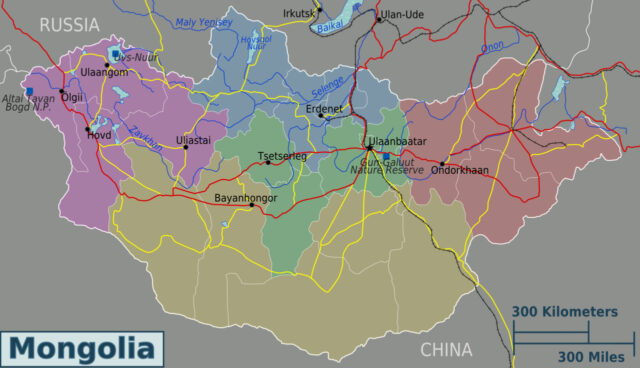Mongolian Foreign Minister will pay a visit to China: why does it matter?

Geopolitical Report ISSN 2785-2598 Volume 30 Issue 11
Author: Guido Keller
Mongolian Foreign Affairs Minister’s upcoming visit to China emphasised the relations between Ulaanbaatar and Beijing and the Chinese strategy to increase its influence in the Asian country because of its strategic position and significant natural resources.
On April 28th, 2023, Chinese Foreign Affairs Minister Spokesperson Mao Ning stated that the Mongolian Foreign Affairs Minister Battsetseg Batmunkh will visit China on May 1st-2nd, 2023.
Although the Chinese spokesperson did not add any other information, the Mongolian Foreign Minister’s visit to the People’s Republic of China emphasises the ties between the two countries.
Mongolia: geopolitics and Chinese interests
Mongolia is a landlocked country in the heart of Asia, which shares borders with Russia and China and has a remarkable and strategic position in the Eurasian geopolitical chessboard.
The country has always been important for its location on the ancient Silk Road, which was a network of trade routes that connected the East and the West. Thanks to its position, the Mongolian territory is a hub for cultural and economic exchanges, where people from different regions gather to trade goods and share ideas. In this context, considering the Belt and Road Initiative that Beijing launched in 2013 to link Europe and Asia and increase trade, Mongolia plays a vital role in the Chinese strategy.
Mongolia is rich in minerals, particularly copper, coal, and gold. Its resources have attracted foreign investments, particularly from China. Therefore, Beijing’s copious investments in the Mongolian market have made the country extremely reliant on Chinese financial support for the national economic development.
Beijing has become a major trading partner of Mongolia since the 1990s, and Ulaanbaatar has recognised the importance of maintaining good relations with the neighbouring People’s Republic of China since it has become a global superpower and is currently the largest trading partner for many countries in Asia.
China has showed a keen interest in Mongolia for several years now because of several reasons, including geopolitical dynamics and economic advantages. This has driven Beijing’s policy towards Mongolia, including political, economic, and cultural initiatives.
One of China’s main motives for investing in Mongolia is economic opportunities. Beijing recognises the country’s economic potential, particularly in the mining sector, which has grown exponentially over the years. China seeks to attain access to these resources and create trade opportunities to strengthen its own economy.
The Chinese Government has also been investing heavily in the Mongolian infrastructure, including roads, railways, and power generation facilities, to ease transportation and logistics.
Mongolia, being a landlocked country, is strategically important for China to keep a check on its neighbours, particularly Russia, considering that the Mongolian territory is a potential gateway to Russia’s Far East. As a result, China has offered economic incentives to Mongolia, including rice aid and infrastructure support. These measures have helped to safeguard Ulaanbaatar’s relationship with Beijing, while also maintaining its independence from Russia.
The Chinese Government is also working to expand its cultural presence in the country, particularly through education initiatives. Indeed, Beijing has invested heavily in offering scholarships for Mongolian students to pursue studies in China. There have been exchange programs between Chinese and Mongolian youth, cultural festivals and film festivals, and television broadcasting. By increasing cultural exchanges, China hopes to strengthen its relationship with Mongolia and promote its soft power in the region.
Why does it matter?
As mentioned above, Mongolia has a strategic role in the Eurasian geopolitical chessboard because of its geographical position and natural resources. The country shares borders with two international powers, such as the Russian Federation and the People’s Republic of China, which have attempted to extend their influence in Mongolia in different spheres.
In this context, China has orchestrated a long-term strategy in Mongolia to deepen diplomatic ties through economic and cultural initiatives, which they believe will ultimately benefit both countries, and, thus, strengthen this relationship and limit Western influence.
The upcoming visit of the Minister of Foreign Affairs of Mongolia to China might further expand relations between Ulaanbaatar and Beijing and, thus, confirm the Chinese influential presence in the Asian country.
On the one hand, China’s interests in Mongolia go beyond economics and extend to regional politics, cultural and diplomatic ties, and pursuing long-term regional strategies. As China expands its influence in the region, Beijing might continue investing publicly in infrastructure and economic initiatives in the Mongolian market.
On the other hand, Mongolia needs to balance out its relationship with China and maintain its territorial integrity, independence, and socio-economic growth.
In this geopolitical scenario, an increasing cooperation between Beijing and Ulaanbaatar might alarm neighbouring Russia, since the Kremlin considers the Asian country an important buffer zone and bridge tower Eastern markets.
Undoubtedly, Mongolia has a relatively long border with Russia, and both countries have a shared history and a close cultural bond. In the past, Moscow supported the regional government, particularly during the Soviet era. Nowadays, Moscow has several interests in Mongolia, primarily because the country strategically separates the Russian and the Chinese territories, assuming the role of a buffer zone between these two international powers.
In addition, Moscow and Ulaanbaatar have established cooperation in the economy, security, and socio-cultural issues. Thus, Russia is Mongolia’s second-largest trading partner, and the two countries have several joint ventures in the mining, energy, and transportation sectors.
The parties cooperate closely on security issues, particularly regarding countering terrorism, drug trafficking, and cross-border crime, organise periodically joint military exercises and have signed several agreements on border security.
Considering Mongolia’s part in Eurasia and the Chinese and Russian investments in the nation, in the near future it is likely Moscow and Beijing will continue to utilise political and economic measures to put pressure on Ulaanbaatar.
Therefore, despite Mongolia attempting to diversify its foreign connections to include the West, particularly the United States, Beijing’s power (and the Russian one) may be an obstruction, preserving Ulaanbaatar’s dependence on its two neighbours.
